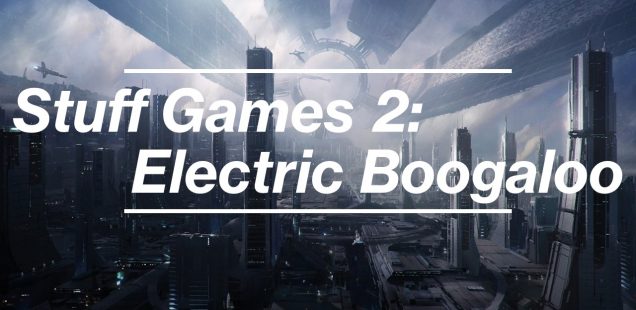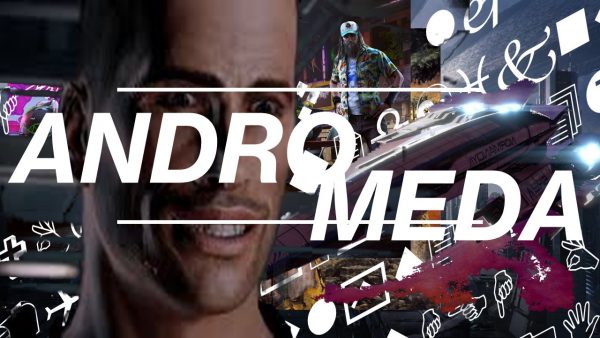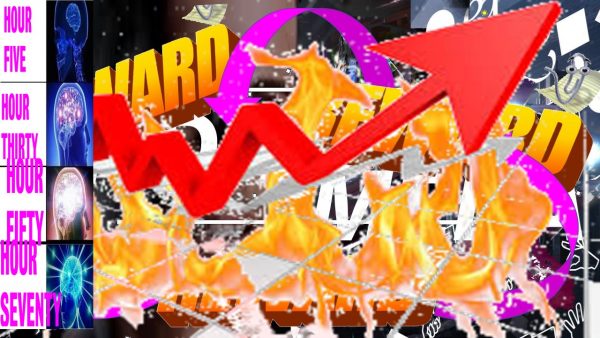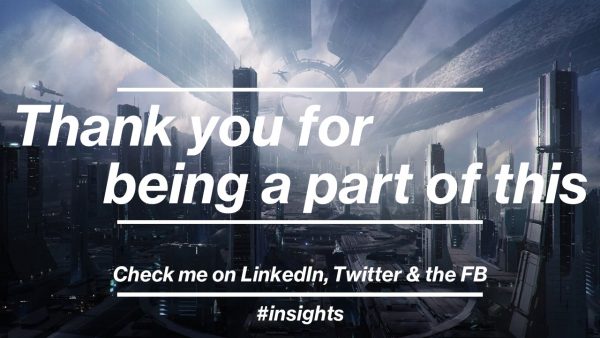
Due Diligence: The Mass Effect Andromeda Trilogy, Part V: Stuff Games 2: Electric Boogaloo
Leigh Harrison takes the big stage.
What if I told you that the characters, setting—even the core gameplay of a videogame were less important to its success than grinding, soul-sucking repetition? Would you believe me?
Well, guess what?
[PAUSE for drama.]
I just did.
[MORE drama.]
And you will.
I’m Leigh Harrison. Welcome to my TED talk.

So, what is a stuff game? If I were put in charge of the dictionary, I’d define them like this:
noun
A videogame in which the player’s primary goal is to complete a large list of discrete tasks from a series of set activity types. These games primarily take place in an open world setting and can last for many hours of repetitive, though often compulsive, play. Examples include the Far Cry series, Homefront: The Revolution, Mad Max, and Mass Effect: Andromeda.
Sounds about right, right?
[NOTE TO SELF: Questions are great. All the best TED talkers use lots of questions to engage the audience and make them feel smart; as if they’re figuring things out with the TED talker rather than just sitting passively, slurping on an iced latte and listening while they scribble notes on an iPad.]
But hey, we’ve got 35 minutes to fill so who’s up for an anecdote? Right now it won’t seem too relevant to my core thesis, but stick with me. Over the course of this half hour it will become more and more relevant—so pay attention!
[PAUSE for laughter. These people have watched a TED talk before and know they all follow a crushingly predictable structure. I’d like to subvert this banality, if only for personal gratification, but TED High Command have warned me that anyone who does is shot on the spot and the auditorium is firebombed with everyone inside to destroy the evidence.]

Back in November 2001, the Christian/not Christian rock band Creed released their seminal third album, Weathered. It’s a great record with some really memorable singles—My Sacrifice, anyone?—and would have been the year’s most fondly remembered disc were it not for a little videogame called Grand Theft Auto III. You’ve all heard of that one too, right?
Amiright, right?
I remember me and my cousin would sit around all day, listening to Creed’s three superb albums on repeat and playing GTA III. We’d drive cars real fast, crash cars, jump cars over sweet jumps. It was a playground of possibilities for us. We’d batter pedestrians to death with baseball bats. Shoot bystanders in the face. Drive trucks through crowds. Throw grenades at school buses. It was a playground of possibilities. The two of us spent entire weekends getting into these sorts of delinquent escapades just to see how the game’s world and its inhabitants would respond to our prodding. I mean, what were we supposed to do with all these tools—we were 10?!
[PAUSE for laughter. This will definitely get a laugh, which will make this upcoming tonal shift that much more uncomfortable.]
Back then, at least to two British pre-teens really into Creed, the idea of cars mounting the sidewalk or shootings in the street were unthinkably unreal acts, so grossly unnecessary that they transcended even performative violence and became mere slapstick. GTA III was so far removed from what we thought people capable of that we couldn’t fathom those actions ever being perpetrated in the real world. (This was in the immediate wake of 9/11, which contemporaneously seemed like a once in a lifetime event; an anomaly, rather than the shape of things to come.) We were admittedly quite sheltered in pre-smartphone Yorkshire but, two decades on, I doubt many youngsters on either side of the Atlantic harbor that same naiveté.
[PAUSE so people know it’s okay to breathe again. We’re done with the heavy stuff for the time being. The audience can stop having to think about how the real world intersects with their playable computer software products—for a moment.]

[SMILE to reassure them we’re back to videogames, cultural artifacts which are, by their very nature, apolitical. I want them to know that the next few minutes will be free from politics or wider real world context.]
I’m 30-odd now and, as much as I enjoyed farting about with Dan way back when, I need my videogames to just work these days.
I tried to play W̶̸̶̸̴̶̵A̸̴̸̵̵̷̷T̸̸̶̶̴̵̸C̷̵̴̶̴̶̷H̷̷̶̵̸̸̵_̴̷̷̴̵̴̵D̵̴̵̶̸̴̸O̸̸̷̷̷̸̸G̸̵̸̷̷̴̴S̵̵̷̶̶̸̴ ̵̴̶̸̶̸̶2̸̶̶̴̸̴̷, recently and gave up after a couple of hours. Like a lot of open world games that came after GTA III, it teeters in a state of flux between its heavily scripted narrative missions and the clockwork chaos waiting to happen in the open world. That’s me being generous: the two are totally at odds.
The story is a playful tale of twenty-something hacker misfits trying to bring down a faceless social media conglomerate with pranks and glib hijinks. I liked the characters and wanted to see more of their narrative unfold. But the game’s unpredictable tinderbox constantly got in the way. I’d be driving to a mission and accidentally run a red, kicking off a chase that two and a half minutes later included three armed helicopters, a dozen squad cars, and the liberal use of lethal force.
[TAKE a sip of lightly carbonated electrolyte water and let people think on that last sentence. Is that an unexpectedly early callback they see cresting yonder hill?]
It’s these two incompatible halves that stop me finding much enjoyment in what W̶̸̶̸̴̶̵A̸̴̸̵̵̷̷T̸̸̶̶̴̵̸C̷̵̴̶̴̶̷H̷̷̶̵̸̸̵_̴̷̷̴̵̴̵D̵̴̵̶̸̴̸O̸̸̷̷̷̸̸G̸̵̸̷̷̴̴S̵̵̷̶̶̸̴ ̵̴̶̸̶̸̶2̸̶̶̴̸̴̷, has to offer. It might simply be that I’m old, tired all the time, and always mildly annoyed by something a younger me would have handwaved without question. Maybe I simply can’t be bothered with the farting I once so loved.
But I also find the copstravaganza aspect of urban open world games exhaustingly bleak. Playing as GTA III’s white, stoic, leather jacketed protagonist reads differently after so many white, stoic, leather jacketed mass shooters. It just does. The game is from a time when this parallel wasn’t so inescapable, but we inevitably bring to it our contemporary knowledge and feelings.
The cops in ₩̶̸̶̸̴̶̵₳̸̴̸̵̵̷̷₮̸̸̶̶̴̵̸₵̷̵̴̶̴̶̷Ⱨ̷̷̶̵̸̸̵_̴̷̷̴̵̴̵Đ̵̴̵̶̸̴̸Ø̸̸̷̷̷̸̸₲̸̵̸̷̷̴̴₴̵̵̷̶̶̸̴ ̵̴̶̸̶̸̶2̸̶̶̴̸̴̷. are trigger-happy and relentless. They appear to be programmed to want to engage the player; and this enduring threat of murder by cop as gameplay mechanic is something I don’t care to experience at this point. Parking on the curb or misjudging a turn always leads to a violent showdown. This is of course beyond frustrating when I just want to get the next story mission; but cops kill people every day in similarly mundane how in the hell did a parking ticket escalate to murder? scenarios.
There’s no comment about this on the game’s part (that I saw); it’s just presented as a thing that happens because games need mechanics and this game is set in a modern city and cities have cops who stop the crimes with guns and choppers and SWAT vans filled with angry men. But when the Venn diagram of stuff that happens in games and stuff that regularly happens in real life is basically a circle, I don’t think you can just present death by cop uncritically and go on calling your super detailed open world AAA playground entertainment.

We’re gonna pivot some here. But I trust in you to follow, my intelligent audience of TED talk boffins.
[PAUSE for thinking time. Do they know where this is going? No. They haven’t a clue at this point. Do I?]
So, Mass Effect: Andromeda is the antithesis of W̶̸̶̸̴̶̵A̸̴̸̵̵̷̷T̸̸̶̶̴̵̸C̷̵̴̶̴̶̷H̷̷̶̵̸̸̵_̴̷̷̴̵̴̵D̵̴̵̶̸̴̸O̸̸̷̷̷̸̸G̸̵̸̷̷̴̴S̵̵̷̶̶̸̴ ̵̴̶̸̶̸̶2̸̶̶̴̸̴̷..
It’s set in space, for one.
[PAUSE for the cheap, yet inevitable, laugh.]
It also has a very generous no BS policy, where every action I take, however mundane—and they often are—is unimpeded and duly rewarded. Hunting space gorillas grants me XP. Scanning rocks provides Research Bucks. Completing quests ups my Planet Habitation Rating. There are main quests, side quests, loyalty quests, sub quests, and fetch quests. Participating in any of these makes one, some, or all of my player metrics rise, creating a dopamine feedback loop that ensures I cannot physically stop playing.
“But, eurgh, that’s any open world videogame, Leigh!”
And you’d be right.
Well, half right.

No single activity in Andromeda is all that compelling. I. Go. To. Place…Shoot. Some. Stuff…Press. Y. Button. On. A. Console. Or. Door. Or. Alien. Spacecraft. And I do this over and over and over again. I’ve spoken in the past about how Assassin’s Creed: Origins is my favourite stuff game because it’s so well lubricated. There are no barriers between me and the next little mission I set for myself. Origins wants me to play it.
The difference between a good stuff game and a bad one is honesty. A good one admits that it is essentially a big string of bleurgh for the player to do until they get bored—and it owns that by making the transition from one activity to the next as imperceptible as possible.
Andromeda knows what it is.
I said something at the beginning of this TED talk in the historic Lowell Hall, Harvard, didn’t I?
[THE QUESTION is good. Encourage them to retain information for long periods of time. This skill might enrich the lives of the few able master it, here, with you.
ALSO you need to remember that if this is repeated at the Oxford University Union as planned you’ll need to update this line.]
While the characters, setting, and core shooting of Andromeda are all to be celebrated, none of them make it the stuff game par excellence of 2017. That honor naturally falls to its stuff design.
There are literally hundreds of quests in Andromeda. Hundreds of opportunities to go somewhere. To shoot some things. To hold Y in front of an inanimate object. There are so many things to do in Andromeda, so many things that are all the same thing, that the things transcend their uniformity and become other things entirely.
The British comedian Stuart Lee has this one type of routine where he incessantly repeats himself, often spending 10 or 15 minutes on a single joke. The first wave will peak at maybe the third or fourth telling. But he’ll continue, driving the point into the ground with slightly different wording or inflection, until he’s sapped the room of energy. Then he’ll continue on, far beyond the point of comfort, until the laughter begins again. And he’ll continue on still, coaxing more and more laughter from the audience; whipping them into a frenzied second wave stronger than the first. And then he’ll stop dead in his tracks. And quickly move on.

Andromeda is the videogame equivalent of a Stewart Lee joke. At hour five, I was taken aback by the sheer scale of this Mass Effect game. How was it this big when the others were so tiny? By hour 30, I knew that the scale had been achieved at a terrible cost. Everything in the game was the same activity of going to a place and shooting things until I could press the Y button.
But I persevered, and by hour 50, I was beginning to understand its quiet genius. If you can stick with it, Andromeda becomes a meditative experience. Everything is so similar to everything else that it blurs into one contiguous mass of stuff. Your unconscious takes over and you begin to exist within the world rather than merely interact with it through a controller.
I’ve discussed before that stuff games often leave me in a state of almost catatonia; my eyes will glaze over and, because repeated actions have become muscle memory, I’ll just go through the preset mechanical motions without really knowing I’m doing it.
Playing Andromeda at the 70 hour mark was like this, except I was fully aware of everything I was doing—I just no longer needed to think to be able to play. It’s the strangest sensation and a feeling I’ve never experienced before with a game. I was fully enveloped by it; a part of it.
[PAUSE to let that sink in. You’ve shared a profound personal truth and should be commended.]

Characters. Setting. Gameplay. They’re all important. But it takes a special game to swallow them whole, chew them into a paste for 70 hours, and present a clump of cud more compelling than the sum of its masticated parts.
Andromeda does this by stripping everything around them down to the bare essentials. Go to a place. Shoot some things. Press a button. Do this for almost three calendar days.
There’s no invisible line drawn between what it considers “story” content and its open world. Everything is everything—because it’s all the same. A story mission might have a cutscene in between me getting to a place and shooting some things, and again once I’ve pressed Y at a console. But what I’m doing is what I’ve always done. And in some mysterious, mind-altering way, Mass Effect: Andromeda manages to perfect the stuff game’s cycle of repetition into a thing of pure, enriching bliss.
[PAUSE for the five minute standing ovation. This is the real end but we’ll do an encore/plug for the people who haven’t ducked out to beat the crowds.]
Thank you all. You’re too kind.
No, you’re the best.
I won’t be signing autographs, no. But check the merch tables outside for my new collection—we’ve done a colab with Reebok!
[That definitely went well. They’re still clapping.]
Okay, okay. You’re too kind! One last callback, if I may.
I spent so much time talking about the disconnect between W̶̸̶̸̴̶̵A̸̴̸̵̵̷̷T̸̸̶̶̴̵̸C̷̵̴̶̴̶̷H̷̷̶̵̸̸̵_̴̷̷̴̵̴̵D̵̴̵̶̸̴̸O̸̸̷̷̷̸̸G̸̵̸̷̷̴̴S̵̵̷̶̶̸̴ ̵̴̶̸̶̸̶2̸̶̶̴̸̴̷. and its wider context because there’s a massive elephant in the room. Mass Effect: Andromeda is a game about colonialism that hopes you don’t notice it’s about colonialism—because it really doesn’t want to talk about colonialism.
We’re going to do that next time.
Leigh Harrison lives in London, and works in communications for a medical charity. He likes canals and rivers a great deal, and spends a lot of his time walking. He occasionally says things about videogames on the Internet, and other things on The Twitter.